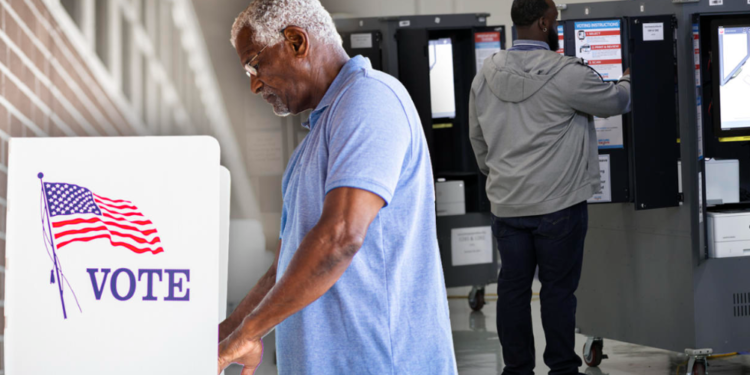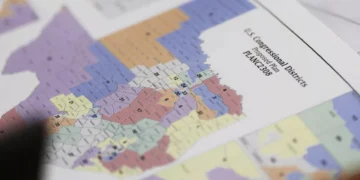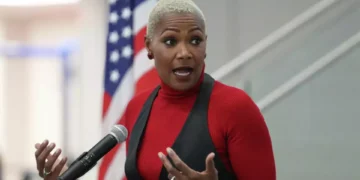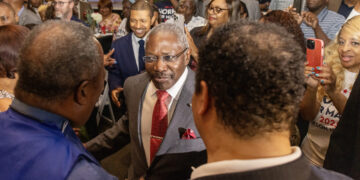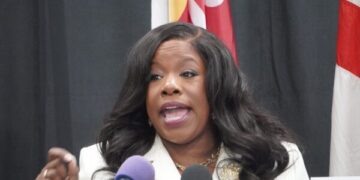Dec 11, 2024 Story by: Editor
Over a month after Election Day, the race for a seat on North Carolina’s Supreme Court remains unresolved as Republican Jefferson Griffin disputes the validity of over 60,000 ballots across the state. Griffin trails Democratic incumbent Allison Riggs by 734 votes, a margin that has remained unchanged after a statewide recount. However, Griffin’s election protests could potentially alter the outcome if accepted.
A News & Observer analysis of these protests reveals that Black registered voters were twice as likely to have their ballots challenged compared to white voters.
Voters between the ages of 18 and 25 were the largest age group among the challenged ballots, making up about 23% of all protests, despite comprising only about 12% of the electorate.
Although Democrats and unaffiliated voters accounted for the majority of the challenged ballots, the analysis also found that about 22% of the disputed votes were cast by registered Republicans.
Matt Mercer, communications director for the NC GOP, stated that the protests were based solely on concerns regarding ineligible voters, spanning all party affiliations and demographics. He placed the blame on the State Board of Elections for counting votes that should have been discarded.
“This has been an incredibly partisan state board throughout the election cycle and they have been inconsistent and uncooperative,” Mercer remarked. “We won’t let these real problems of their own making go unaddressed.”
A hand recount in certain precincts is expected to be completed this week, though it could take months to resolve Griffin’s protests, which are already being challenged in federal court.
Riggs has declared victory and criticized Griffin’s efforts, saying he is trying to “toss votes instead of conceding.”
“We are focused on ensuring that voters are heard, not silenced, and that every lawful vote counts in this election,” Embry Owen, Riggs’ campaign manager, commented when asked about the demographic disparities in the protests. “It does not matter the voter’s partisan affiliation or who they voted for. Every lawful vote must count.”
The Election Protests
Candidates are allowed to file election protests if they believe ineligible voters cast ballots. Griffin’s protests cite six main reasons for challenging voters, including suspicions that some may have been serving felony sentences on Election Day, as well as a legal argument that military and overseas voters should not be allowed to vote without ID.
Most of Griffin’s protests, however, claim that voters without a driver’s license or Social Security number on their registration forms should have their ballots invalidated.
A federal judge appointed by former President Donald Trump previously rejected part of this argument in a case filed this summer by the Republican National Committee, but Griffin and the NC GOP maintain that these voters should be deemed ineligible.
“Every voter in North Carolina deserves confidence that our elections are conducted fairly and according to the law,” NCGOP Chair Jason Simmons said in a statement when Griffin filed his protests. “The integrity of the ballot box is the cornerstone of our democracy. Jefferson Griffin’s commitment to this process demonstrates his dedication to upholding the rule of law and protecting the voices of lawful voters.”
An analysis of the demographics of the challenged voters revealed that Black voters accounted for about 20% of all protests, while white voters made up about 33%. However, white voters outnumber Black voters statewide by more than three to one.
When comparing the percentage of challenged voters in each racial group to the overall registered voters, Black voters were found to be twice as likely to have their ballots contested, a disparity that held true regardless of party affiliation.
Around 38% of the challenged voters had no race listed on their voter registration. Chris Cooper, a political scientist at Western Carolina University, suggested that this reflects a growing trend of voters leaving optional demographic fields blank when registering.
Bob Hall, a longtime North Carolina government watchdog, pointed out that the state has previously enacted laws that targeted Black voters, such as the 2016 U.S. 4th Circuit Court of Appeals ruling, which found North Carolina’s former voter ID law specifically discriminated against Black voters.
“Over and over again, in these cases where Republican operatives and candidates and legislators are taking action to get more power — they’re doing it at the expense of Black voters,” Hall said.
Protests Moving to Court
The State Board of Elections, which has a 3-2 Democratic majority, is set to consider Griffin’s protests on Wednesday.
Griffin has requested that one of the board’s Democratic members, Siobhan Millen, recuse herself because her husband, Press Millen, is a partner at the law firm representing Riggs. Press Millen told The News & Observer that he is not involved in representing Riggs in any matters before the board and is ethically shielded from the firm’s work on the case.
If the board rules against Griffin, he can appeal the decision to Wake County Superior Court, and the case could eventually make its way to the state Supreme Court.
Meanwhile, Democrats are taking their own legal action, filing a federal lawsuit to have Griffin’s protests dismissed.
In a lawsuit filed Friday, the North Carolina Democratic Party argued that the protests could lead to “mass disenfranchisement” and violate the fundamental right to vote of North Carolinians.
“They can’t stop the results of an election just because they don’t like the fact that we won,” NCDP Chair Anderson Clayton said in a statement.
Delayed Court Races in the Past
This isn’t the first Supreme Court race in North Carolina delayed by election protests.
In 2020, Republican Chief Justice Paul Newby narrowly defeated Democrat Cheri Beasley by 401 votes after weeks of recounts and challenges. An analysis by The News & Observer at the time found that Newby’s protests disproportionately targeted Black voters.
Beasley filed her own protests, but they were aimed at restoring ballots that had been discarded. The News & Observer found that registered Republicans were largely excluded from her protests.
Beasley eventually conceded to Newby on Dec. 12, after a hand recount confirmed his victory. Source: Yahoo News


